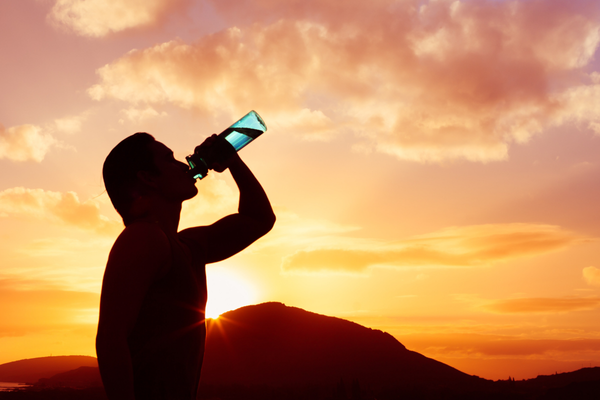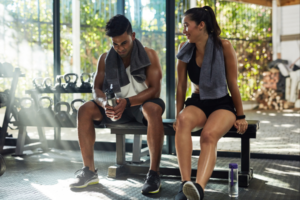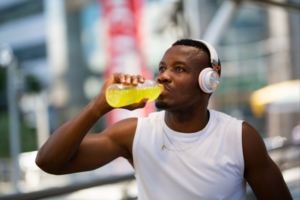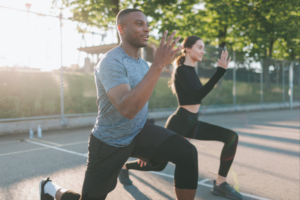
Post Workout Hydration: An In-Depth Guide
September 18, 2024
After a rigorous workout, hydrating your body is more important than you might think. Failing to drink enough water can lead to serious consequences, including fatigue, muscle cramps, and a longer recovery time. In this guide, we’ll explore why post-workout hydration matters, how it affects your body, and what you can do to stay properly hydrated for better recovery and performance.
1. Why Post-Workout Hydration is Important

Replenishing Lost Fluids:
During exercise, your body can lose a surprising amount of water through sweat. On average, you might lose between 0.5 to 2 liters of water per hour, depending on the intensity of the activity, your environment, and your personal sweat rate. Rehydrating after exercise is crucial because water makes up around 60% of your body and plays a key role in virtually every bodily function, from regulating temperature to transporting nutrients. Without enough water, your muscles and organs can’t function properly, leading to sluggishness and a weakened immune system.
Maintaining Electrolyte Balance:
Electrolytes—like sodium, potassium, and magnesium—are essential minerals that help control muscle contractions and fluid balance. When you sweat, you lose these important electrolytes along with water. Without replenishing them, you risk developing muscle cramps, dizziness, and even electrolyte imbalances, which can severely affect your performance and recovery. Sodium, in particular, helps your body retain fluids, while potassium supports muscle function and magnesium assists with muscle relaxation and energy production. That’s why it’s important not just to rehydrate with water but to also replace lost electrolytes.
Supporting Muscle Recovery:
Proper post-workout hydration goes beyond just quenching your thirst; it’s a vital part of muscle recovery. After an intense workout, your muscles experience tiny tears that need repair to grow stronger. Water helps transport nutrients like proteins and carbohydrates to your muscle cells, aiding in this repair process. Additionally, staying hydrated can reduce muscle soreness, commonly known as delayed onset muscle soreness (DOMS), by flushing out waste products such as lactic acid that accumulate during exercise. Without sufficient hydration, muscle recovery slows down, leaving you sore for longer and possibly increasing the risk of injury.
Preventing Dehydration:
Dehydration is a common post-exercise issue that can have serious repercussions if ignored. Signs of dehydration include dry mouth, dizziness, dark-colored urine, and excessive thirst. Severe dehydration can lead to heat exhaustion or heatstroke, which can be dangerous, especially during hot or humid conditions. It’s important to hydrate not only during your workout but also immediately after, as your body continues to lose fluids while cooling down. Drinking enough water after exercise helps regulate body temperature, keep blood volume stable, and ensure that your body can efficiently carry nutrients to where they’re needed most.
2. Best Ways to Hydrate After a Workout

Water: The Most Basic Form of Hydration
When it comes to post workout hydration, water is your go-to option. It’s the simplest, yet most effective way to rehydrate after sweating it out in the gym. But how much water should you drink? A good rule of thumb is to consume around 16-24 ounces of water for every pound of body weight lost during exercise. This ensures your body replenishes the fluids needed for optimal recovery and performance.
Electrolyte Drinks: When Are They Necessary?
Sports drinks packed with electrolytes are useful for more intense workouts or long-duration exercises where you lose more than just water through sweat. These drinks help restore essential electrolytes like sodium, potassium, and magnesium, which are vital for muscle function and hydration. However, they aren’t necessary for every workout, especially if you’re exercising for less than an hour. Save them for when you’re doing high-intensity training, running marathons, or in hot, humid conditions.
Coconut Water: A Natural Option for Hydration
Coconut water offers a natural alternative to traditional sports drinks for post workout hydration. It’s packed with electrolytes, particularly potassium, making it a great way to rehydrate and replenish nutrients after moderate exercise. Plus, coconut water is low in calories and sugars, which makes it a healthier option compared to some commercial sports drinks.
Mobile IV Hydration Therapy: Fast Recovery
For those looking for rapid recovery, mobile IV hydration therapy is an increasingly popular choice. These treatments deliver fluids, electrolytes, vitamins, and minerals directly into your bloodstream, allowing for quicker and more effective absorption. While it’s not necessary for everyone, mobile IV therapy can be beneficial for athletes or those who need a quick recovery after intense or prolonged physical activity.
Fruits and Vegetables: Hydration from High-Water-Content Foods
Don’t forget that hydration doesn’t only come from liquids. Many fruits and vegetables are rich in water content and can help with post workout hydration. Foods like watermelon, cucumbers, oranges, and spinach contain a high percentage of water, making them an excellent source of hydration while also providing vitamins and minerals to support recovery.
3. Key Nutrients to Include in Your Post-Workout Hydration
Electrolytes: Why Sodium, Potassium, and Magnesium Matter
Electrolytes are crucial for maintaining fluid balance and supporting muscle function. Sodium helps your body retain the water you drink, potassium supports muscle contraction, and magnesium aids in muscle relaxation. After sweating, your electrolyte levels drop, and without replenishing them, you risk muscle cramps, fatigue, and even dehydration. Ensure your post workout hydration includes these essential minerals to keep your body functioning optimally.
Carbohydrates and Protein: Fueling Recovery
While hydration is important, so are carbs and protein when it comes to recovery. Carbohydrates help restore glycogen levels that are depleted during exercise, while protein aids in muscle repair. A combination of hydration and these nutrients ensures that your body recovers faster and you’re ready for your next workout.
Vitamins and Minerals: Key for Hydration and Muscle Recovery
Vitamins, particularly B, C, and D, play an important role in hydration and muscle recovery. B vitamins support energy metabolism, while vitamin C helps repair tissues. Vitamin D, on the other hand, supports muscle function and overall recovery. Including these vitamins in your post workout hydration routine helps your muscles recover faster and reduces fatigue.
4. How to Tailor Your Post Workout Hydration Based on Workout Intensity

Light to Moderate Exercise: Hydration Needs
For light to moderate workouts, hydration doesn’t need to be complicated. Typically, drinking water is sufficient to replace the fluids lost during activities like walking, yoga, or light jogging. It’s recommended to drink around 8-12 ounces of water within 30 minutes after your workout. If you’ve been sweating more than usual, a basic electrolyte drink might be beneficial, but in most cases, water alone will cover your post workout hydration needs.
High-Intensity or Endurance Training: The Role of Electrolytes
If your workout involves high-intensity or endurance training, such as running, cycling, or intense HIIT sessions, your hydration strategy needs to be more targeted. During these activities, you lose more than just water; electrolytes are depleted as well. In these cases, a combination of water and an electrolyte-rich drink is crucial. Aim to drink about 16-24 ounces of a sports drink or electrolyte beverage that replenishes sodium, potassium, and magnesium to support your body’s hydration and recovery.
Post-Strength Training: Hydration with Muscle-Repairing Nutrients
After strength training, hydration needs are slightly different. Along with replacing lost fluids, it’s essential to include muscle-repairing nutrients like protein and carbohydrates in your post workout hydration plan. A protein shake combined with water or a sports drink can be an effective way to rehydrate while also providing the nutrients needed for muscle recovery. This helps your muscles repair and grow while ensuring you stay properly hydrated.
5. Common Hydration Mistakes to Avoid
Not Drinking Enough Water
Multiple studies have found that 75% of Americans are chronically dehydrated (Quench Water, 2022).
One of the most common mistakes people make after working out is not drinking enough water. It’s easy to underestimate how much fluid is lost during exercise, especially if you’re not sweating excessively. On average, the body loses about 1-2 liters of water per hour during moderate to intense exercise. Replenishing that fluid is critical to avoid dehydration, so make sure you’re drinking the right amount based on the intensity and duration of your workout.
Overconsumption of Sugary Sports Drinks
Another mistake is relying too heavily on sugary sports drinks. While these drinks are useful for high-intensity and endurance training, consuming too much sugar can actually hinder proper hydration. Excessive sugar can slow down the absorption of fluids, leading to sluggish recovery. For most workouts, water or low-sugar electrolyte drinks are a better option to stay hydrated without the added calories or sugar crash.
Ignoring Electrolytes
Neglecting to replenish electrolytes can be just as harmful as not drinking enough water. Electrolytes, such as sodium, potassium, and magnesium, play a vital role in maintaining your body’s fluid balance and muscle function. After a workout, especially if you’ve been sweating heavily, it’s important to include an electrolyte source in your post workout hydration plan. Failing to do so can lead to muscle cramps, fatigue, and a slower recovery.
6. Special Hydration Considerations
Hot and Humid Weather: Impact on Hydration
In hot and humid conditions, your body loses fluids at a faster rate due to increased sweating. This means that your post workout hydration needs will be higher than usual. To stay properly hydrated in these environments, it’s essential to drink water consistently before, during, and after your workout. Consider adding an electrolyte drink to replenish lost minerals, especially during prolonged exposure to heat. Failing to adapt your hydration routine to environmental conditions can lead to dehydration and heat-related illnesses.
The National Council on Aging reports that you can drop 2-3% of your body weight through lost fluids before you even realize you’re thirsty — which is especially true as we age” (Taylor K, Tripathi AK, Jones EB. Adult Dehydration. [Updated 2022 Oct 3]. In: StatPearls [Internet]. Treasure Island (FL): StatPearls Publishing; 2024 Jan-. Available from: https://www.ncbi.nlm.nih.gov/books/NBK555956/).
Hydration for Athletes: Specific Guidelines
Athletes who train regularly need a more refined approach to hydration. Because of their frequent and intense activity, they require not only more fluids but also a careful balance of electrolytes. For athletes, staying hydrated is essential for maintaining peak performance and avoiding cramps, fatigue, or injury. Post workout hydration for athletes should include water, electrolytes, and sometimes even IV therapy for quick recovery after particularly grueling sessions.
Recovery After Long Runs or Marathons
After long runs or marathons, rehydration becomes a critical part of the recovery process. Extended endurance exercise depletes both fluid and electrolyte stores significantly, so replenishing them quickly is key. Start by drinking water immediately after the race, followed by an electrolyte-rich drink. Post workout hydration should also include nutrient-dense foods that aid in recovery, like fruits and vegetables. In some cases, IV hydration therapy can provide faster recovery, especially when time is limited between races or training sessions.
Proper hydration is a cornerstone of effective post workout recovery. It helps replenish lost fluids, restore electrolytes, and support muscle recovery, allowing your body to bounce back faster. Tailoring your post workout hydration plan to your exercise intensity and specific needs can make a significant difference in your overall performance and recovery.
If you’re looking to optimize your recovery, consider scheduling an appointment with Uplift IV Wellness for hydration IV therapy. It’s a fast and effective way to ensure you’re getting the fluids and nutrients your body needs after exercise.